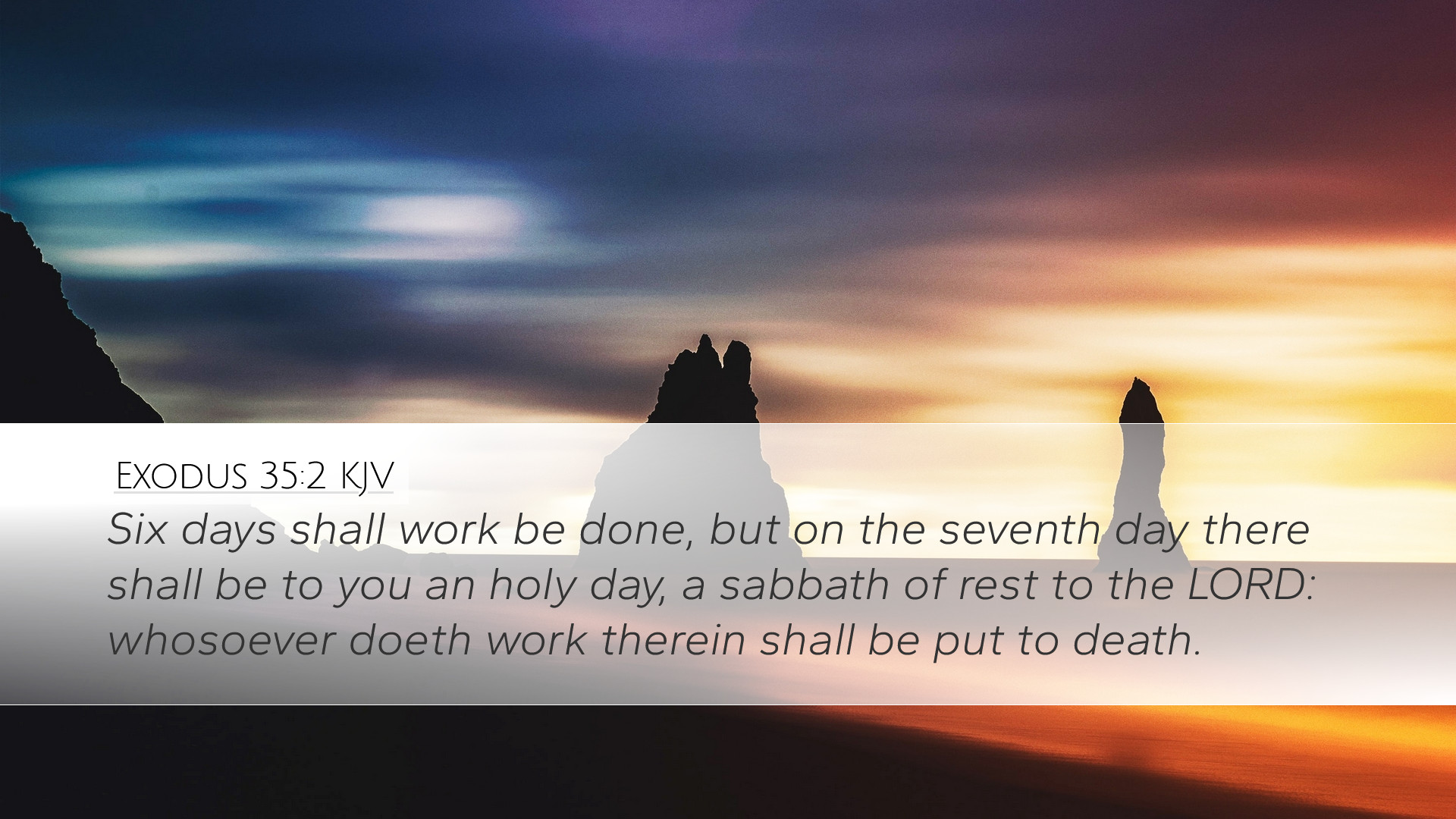Exodus 35:2 Commentary
Verse: "Six days shall work be done; but on the seventh day there shall be to you a holy day, a sabbath of rest to the Lord: whosoever doeth work therein shall be put to death."
Introduction
The verse from Exodus 35:2 emphasizes the importance of the Sabbath as a day of rest, enshrined within the context of Israel’s covenantal relationship with God. It serves as a reminder of divine rest and the call to holiness on this sacred day. The insights drawn from various public domain commentaries provide a rich theological understanding of this commandment, examining its implications for the ancient Israelites and contemporary believers alike.
Historical Context
This verse occurs within the broader framework of the Mosaic Law, where the Israelites are instructed on various religious and civil obligations after their exodus from Egypt. The Sabbath command is a sign of the covenant between God and His people, symbolizing their liberation from bondage and their commitment to divine worship.
Commentary Insights
Matthew Henry's Commentary
Matthew Henry emphasizes that the Sabbath was instituted at creation and reiterated in the Mosaic Law as a perpetual observance. He notes:
- The Nature of the Sabbath: It is a sacred day set apart not just for rest, but for renewed relationship with God.
- Divine Authority: The command reflects God's sovereign right to dictate how His people should spend their time, asserting that the Sabbath's observance is an act of obedience to God.
Albert Barnes' Notes
Albert Barnes provides further insights into the implications of this command:
- Work and Worship: Barnes points out that the prohibition of work on the Sabbath serves to highlight the integral relationship between worship and rest; ceasing from labor allows a focus on divine things.
- Consequences of Disobedience: The severe penalty for violating the Sabbath underscores its seriousness as part of the covenant, revealing how those who defy this law are positioning themselves against God’s established order.
Adam Clarke's Commentary
Adam Clarke explores the spiritual and practical implications of this verse:
- Symbolism of Rest: Clarke elaborates on the idea that Sabbath rest symbolizes spiritual rejuvenation, a time for believers to reflect and engage with God.
- Community Aspect: He highlights the social dimensions of Sabbath observance, suggesting that it fosters community and spiritual solidarity among practitioners, promoting a collective identity centered in worship.
Theological Reflections
The Sabbath serves multifaceted purposes:
- Restoration: It represents a necessary pause in the rhythm of life, allowing for physical and spiritual restoration.
- Faithfulness: Observing the Sabbath demonstrates faith in God's provision and sovereignty, acknowledging that true rest can only be found in Him.
- Identity: The Sabbath establishes the identity of God's people as those set apart for holy purposes, distinguishing them from other nations.
Practical Applications for Today
The principles extracted from Exodus 35:2 remain pertinent for modern believers, inviting reflection on contemporary Sabbath practices.
- Time for Worship: Encouraging dedicated time for worship and community fellowship should be prioritized even in today's busyness.
- Work-Life Balance: The command to rest teaches the necessity of balance—where physical and spiritual health must be considered in our hectic lives.
- Covenantal Living: Integrating the essence of Sabbath rest into daily life helps reinforce our identity as God's people.
Conclusion
Exodus 35:2 serves as a profound reminder of God’s instructions regarding rest and worship. The insights from respected commentaries like those of Matthew Henry, Albert Barnes, and Adam Clarke allow pastors, students, theologians, and Bible scholars to grasp the depth of this verse beyond mere adherence to a command. At its core, it calls for an understanding of God’s heart for humanity, providing both physical rest and spiritual rejuvenation.


